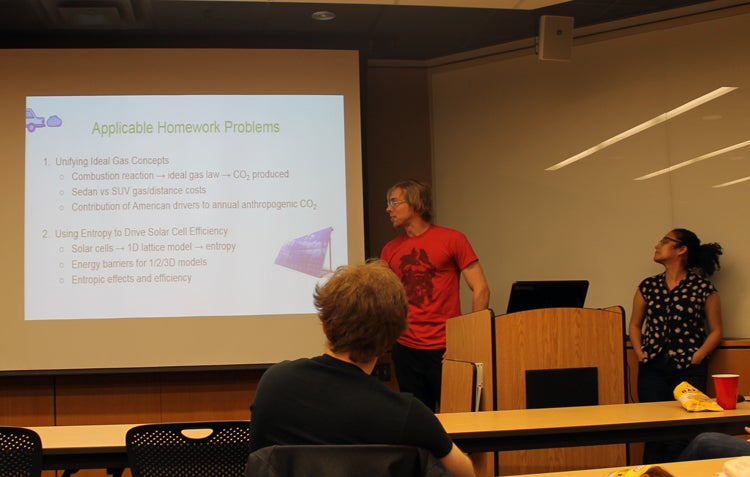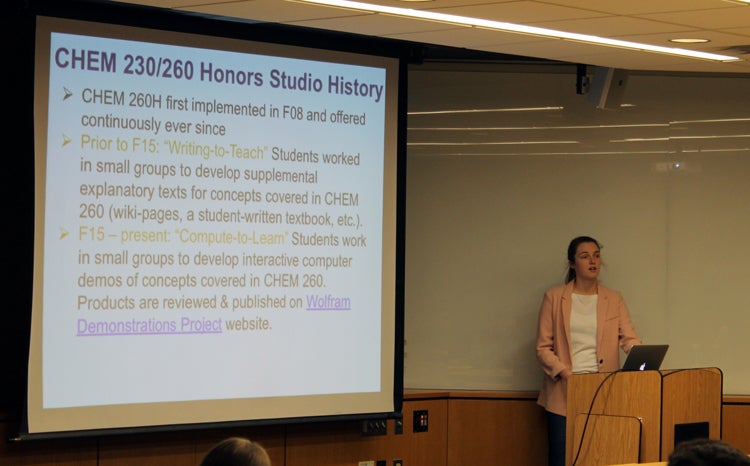On April 6th, CSIEUM hosted a FFGSI Update event to give 30 attendees an idea about the types of projects FFGSIs participate in. During the program, attendees heard about three projects featured thermodynamics, organic chemistry, and coding.
 Laura Motta Medina & Alan Rask, from the Zimmerman Lab, discussed “CHEM 463: The Thermodynamics of Sustainability” where they developed homework problems and discussion content relating thermodynamic principles and models to real world phenomenon such as the green house effect, hurricanes, and black holes. The students were able to relate these concepts to their everyday life and discover the strengths and limitations of simple models for real world problems. For their final project centering on sustainability, the students proposed topics including thermodynamics of recycling and ocean circulation, among other ideas.
Laura Motta Medina & Alan Rask, from the Zimmerman Lab, discussed “CHEM 463: The Thermodynamics of Sustainability” where they developed homework problems and discussion content relating thermodynamic principles and models to real world phenomenon such as the green house effect, hurricanes, and black holes. The students were able to relate these concepts to their everyday life and discover the strengths and limitations of simple models for real world problems. For their final project centering on sustainability, the students proposed topics including thermodynamics of recycling and ocean circulation, among other ideas.
 Janelle Kirsch & Evan Bornowski, from the Wolfe Lab, highlighted their work on a new CHEM 216 course entitled “Medicinal Chemistry: Anti-Cancer Drugs.” The objective of this new course is to bring current research into introductory laboratories. The 31 students that participated in this lab synthesized 24 analogs of a novel molecule shown to have anti-tumor activity in triple negative breast cancer cells. Additionally, the partnering medicinal chemistry research lab assayed these analogs to compare their activity to the original target molecule.
Janelle Kirsch & Evan Bornowski, from the Wolfe Lab, highlighted their work on a new CHEM 216 course entitled “Medicinal Chemistry: Anti-Cancer Drugs.” The objective of this new course is to bring current research into introductory laboratories. The 31 students that participated in this lab synthesized 24 analogs of a novel molecule shown to have anti-tumor activity in triple negative breast cancer cells. Additionally, the partnering medicinal chemistry research lab assayed these analogs to compare their activity to the original target molecule.
 Finally, Ellen Mulvihill, also from the Geva Lab, gave an update on the course “CHEM 230/260 Honors Studio: Compute-to-Learn.” Open to all types of students, most without any coding background, this studio course gave students the opportunity to engage in creative forms of active learning while acquiring familiarity with a widely used software package. Students participate in tutorials and training related to Mathematica software, research and propose an original demonstration idea, workshop the idea during design and production stages, and finally submit the final product to external review prior to publication and dissemination on the Wolfram Demonstrations Project website.
Finally, Ellen Mulvihill, also from the Geva Lab, gave an update on the course “CHEM 230/260 Honors Studio: Compute-to-Learn.” Open to all types of students, most without any coding background, this studio course gave students the opportunity to engage in creative forms of active learning while acquiring familiarity with a widely used software package. Students participate in tutorials and training related to Mathematica software, research and propose an original demonstration idea, workshop the idea during design and production stages, and finally submit the final product to external review prior to publication and dissemination on the Wolfram Demonstrations Project website.

